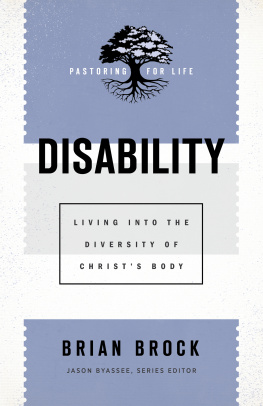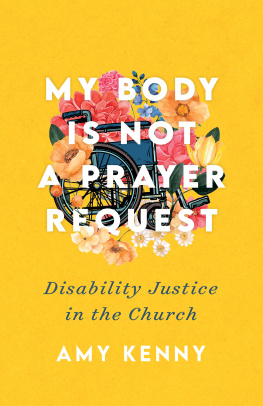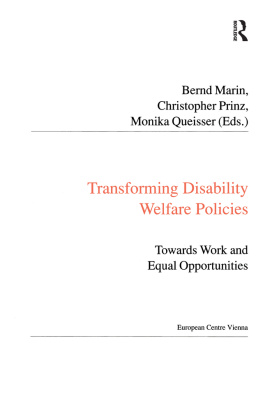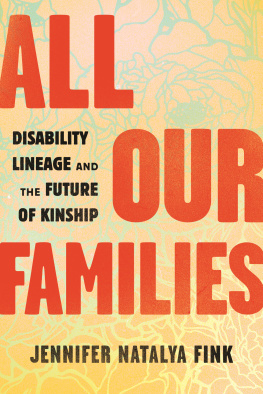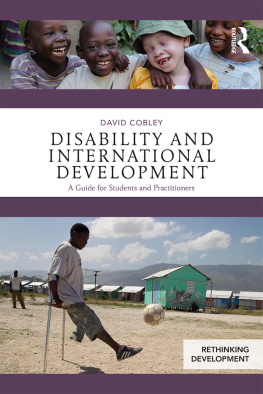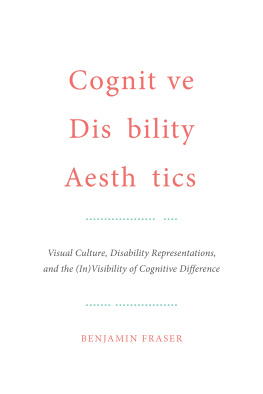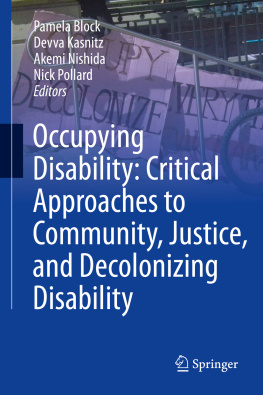Disability and Colonialism
The mapping, control and subjugation of the human body and mind were core features of the colonial conquest. This book draws together a rich collection of diverse, yet rigorous, papers that aim to expose the presence and significance of disability within colonialism, and how disability remains present in the establishment, maintenance and continuation of colonial structures of power. Disability as a site of historical analysis has become critically important to understanding colonial relations of power and the ways in which gender and identity are defined through colonial categorisations of the body. Thus, there is a growing prominence of disability within the historical literature. Yet, there are few international anthologies that traverse a critical level of depth on the subject domain. This book fills a critical gap in the historical literature and is likely to become a core reader for post graduate studies within disability studies, postcolonial studies and more broadly across the humanities.
The chapters in this book were originally published in Social Identities: Journal for the Study of Race, Nation and Culture.
Karen Soldatic is an Australian Research Council DECRA Fellow at the Institute of Culture and Society, Western Sydney University, Australia. Karen has extensive experience within the field of international development in post conflict zones. Her work brings together this rich field work to theoretically inform conceptual understandings of disability. She has been awarded a number of prestigious research fellowships including a British Academy International Visiting Fellowship (2012) and a Centre for Human Rights Education, Curtin University Early Career Research Fellowship (20112012).
Shaun Grech is Director of The Critical Institute, Malta, Visiting Fellow at Manchester Metropolitan University, UK, and editor-in-chief of the international journal, Disability in the Global South (DGS). Shaun is also an activist and practitioner working with disabled people in extreme rural poverty in Latin America.
Disability and Colonialism
(Dis)encounters and anxious
intersectionalities
Edited by
Karen Soldatic and Shaun Grech
First published 2016
by Routledge
2 Park Square, Milton Park, Abingdon, Oxon, OX14 4RN, UK
and by Routledge
711 Third Avenue, New York, NY 10017, USA
Routledge is an imprint of the Taylor & Francis Group, an informa business
2016 Taylor & Francis
All rights reserved. No part of this book may be reprinted or reproduced or utilised in any form or by any electronic, mechanical, or other means, now known or hereafter invented, including photocopying and recording, or in any information storage or retrieval system, without permission in writing from the publishers.
Trademark notice: Product or corporate names may be trademarks or registered trademarks, and are used only for identification and explanation without intent to infringe.
British Library Cataloguing in Publication Data
A catalogue record for this book is available from the British Library
ISBN 13: 978-1-138-64573-8
Typeset in Times New Roman
by RefineCatch Limited, Bungay, Suffolk
Publishers Note
The publisher accepts responsibility for any inconsistencies that may have arisen during the conversion of this book from journal articles to book chapters, namely the possible inclusion of journal terminology.
Disclaimer
Every effort has been made to contact copyright holders for their permission to reprint material in this book. The publishers would be grateful to hear from any copyright holder who is not here acknowledged and will undertake to rectify any errors or omissions in future editions of this book.
Contents
Shaun Grech and Karen Soldatic
Shaun Grech
Esme Cleall
Stefanie Kennedy
Karen Soldatic
Tanya Titchkosky and Katie Aubrecht
Ann Lazarsfeld-Jensen
Rachel A.D. Bloul
The following chapters were originally published in Social Identities: Journal for the Study of Race, Nation and Culture, volume 21, issue 1 (May 2015). When citing this material, please use the original page numbering for each article, as follows:
Introduction
Disability and colonialism: (dis)encounters and anxious intersectionalities
Shaun Grech and Karen Soldatic
Social Identities: Journal for the Study of Race, Nation and Culture, volume 21, issue 1 (May 2015) pp. 15
Chapter 1
Decolonising Eurocentric disability studies: why colonialism matters in the disability and global South debate
Shaun Grech
Social Identities: Journal for the Study of Race, Nation and Culture, volume 21, issue 1 (May 2015) pp. 621
Chapter 2
Orientalising deafness: race and disability in imperial Britain
Esme Cleall
Social Identities: Journal for the Study of Race, Nation and Culture, volume 21, issue 1 (May 2015) pp. 2236
Chapter 3
Let them be young and stoutly set in limbs: race, labor, and disability in the British Atlantic World
Stefanie Kennedy
Social Identities: Journal for the Study of Race, Nation and Culture, volume 21, issue 1 (May 2015) pp. 3752
Chapter 4
Postcolonial reproductions: disability, indigeneity and the formation of the white masculine settler state of Australia
Karen Soldatic
Social Identities: Journal for the Study of Race, Nation and Culture, volume 21, issue 1 (May 2015) pp. 5368
Chapter 5
WHOs MIND, whose future? Mental health projects as colonial logics
Tanya Titchkosky and Katie Aubrecht
Social Identities: Journal for the Study of Race, Nation and Culture, volume 21, issue 1 (May 2015) pp. 6984
The following chapter was originally published in Social Identities: Journal for the Study of Race, Nation and Culture, volume 20, issue 23 (March 2014). When citing this material, please use the original page numbering for the article, as follows:
Chapter 6
A Foucauldian journey into the islands of the deaf and blind
Ann Lazarsfeld-Jensen
Social Identities: Journal for the Study of Race, Nation and Culture, volume. 20, issue 23 (March 2014) pp. 214223
The following chapter was originally published in Social Identities: Journal for the Study of Race, Nation and Culture, volume 18, issue 1 (January 2012). When citing this material, please use the original page numbering for the article, as follows:
Chapter 7
Aint I a woman? Female landmine survivors beauty pageants and the ethics of staring
Rachel A.D. Bloul
Social Identities: Journal for the Study of Race, Nation and Culture, volume 18, issue 1 (January 2012) pp. 318
For any permission-related enquiries please visit:
http://www.tandfonline.com/page/help/permissions
Katie Aubrecht, PhD, is a Canadian Institutes of Health Research Postdoctoral Fellow, Mount Saint Vincent University, and Research Coordinator at the Nova Scotia Centre on Aging. Katie uses intersectional, postcolonial, and interpretive sociological theories and qualitative research methods to examine the social construction of mental life. Her research and teaching adopts a disability studies perspective, which privileges the lived experience of disability. She has published in


